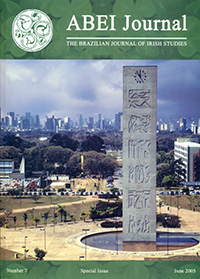Elizabeth Bowen’s Suburbia: Life After the Big House
DOI:
https://doi.org/10.37389/abei.v7i1.184268Palavras-chave:
Elizabeth Bowen, The Disinherited, Big HouseResumo
This essay focuses on Bowen’s short story “The Disinherited”. It is an appropriate title because it deals with a world of disempowered aristocrats who inhabit the new world of housing estates and suburbia, ghostly remnants of an older order. What elevates this story beyond a simple lament for an impotent aristocracy is the introduction of the character Prothero: a murderer on the run who is presented writing the story of his crime night after night. He is a mysterious and ultimately threatening image of modernity and all that it may entail. It is a story that essentially draws a picture of the conflict between the old world and the new world, between those who are “made” out of a class structure which is passing away and those who “made” themselves. In “The Disinherited” Bowen allows herself to express her very real fears about the emergence of a new world order where power and authority have shifted away from her class and caste. The element that gives “The Disinherited” such a menacing air is the presence of the character Prothero. It allows Bowen to widen her focus beyond the new middle classes and the failed aristocracy and consider, in the person of Prothero, those whom she believes are set to inherit the modern world.
Referências
Heath, William. Elizabeth Bowen: An Introduction to her Novels. Madison: The University of Wisconsin Press, 1961.
Lassner, Phyllis. Elizabeth Bowen: A Study of the Shorter Fiction. New York: Twayne Publishers, 1991.
Weekes, Ann Owen. Irish Women Writers: An Uncharted Tradition. Lexington, Kentucky: The University Press of Kentucky, 1990.
Downloads
Publicado
Edição
Seção
Licença
Copyright (c) 2005 Derek Hand

Este trabalho está licenciado sob uma licença Creative Commons Attribution-NonCommercial 4.0 International License.


